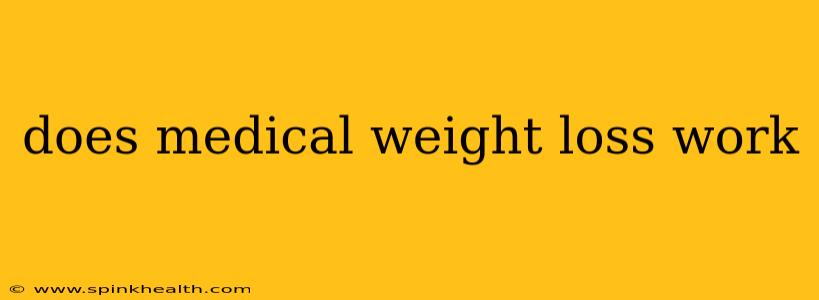Does Medical Weight Loss Work? A Doctor's Perspective
The question "Does medical weight loss work?" isn't a simple yes or no. It's a journey, a partnership between you and a healthcare professional, and the success hinges on various factors. Imagine it like this: you wouldn't attempt to build a complex piece of furniture without instructions – weight loss is much the same. It requires a tailored plan, understanding your body, and consistent effort. Let's explore this intricate process.
My name is Dr. Evelyn Reed, and I've spent over a decade helping patients achieve sustainable weight loss. I've witnessed firsthand the transformative power of a medically supervised approach, but also the pitfalls of unrealistic expectations. This article aims to provide a balanced and informed perspective on medical weight loss programs.
What is Medical Weight Loss?
Medical weight loss isn't just about shedding pounds; it's about improving your overall health and well-being. Unlike fad diets, it involves a comprehensive assessment of your health status, identifying underlying conditions that might contribute to weight gain (such as hypothyroidism or sleep apnea), and developing a personalized plan. This often includes a combination of:
- Dietary changes: A registered dietitian works with you to create a nutrition plan that's both sustainable and effective, focusing on nutrient-dense foods and portion control. This isn't about deprivation but about making informed choices.
- Lifestyle modifications: Exercise is crucial, but the program tailors the intensity and type to your fitness level, gradually increasing the challenge. Sleep, stress management, and mental well-being are also addressed.
- Medications (if appropriate): In some cases, medications might be recommended to help suppress appetite or boost metabolism, but only after a thorough evaluation of your health. These are not miracle cures and are used in conjunction with other strategies.
- Behavioral therapy: Addressing emotional eating habits and developing coping mechanisms is a key component of lasting weight loss.
Does Medical Weight Loss Work Better Than Dieting Alone?
Yes, often significantly so. Medical weight loss programs are more successful because they address the multifaceted nature of weight management. They provide support, guidance, and personalized strategies that go beyond simply counting calories. Dieting alone often lacks this crucial support system, leading to frustration, plateaus, and eventual relapse.
What are the Benefits of Medical Weight Loss?
The benefits extend far beyond the number on the scale:
- Improved health markers: Reduced blood pressure, cholesterol, and blood sugar levels are common outcomes.
- Increased energy levels: Feeling more energized and less sluggish is a significant benefit.
- Improved sleep: Weight loss often leads to improved sleep quality.
- Boosted self-esteem and confidence: Achieving weight loss goals can have a profound positive impact on mental well-being.
- Reduced risk of chronic diseases: Losing weight can significantly decrease the risk of developing type 2 diabetes, heart disease, and certain types of cancer.
What are the Potential Risks and Side Effects of Medical Weight Loss?
While generally safe, some potential risks exist, particularly with medication use. These must be discussed thoroughly with your doctor. Side effects can vary depending on the individual and the specific medications prescribed.
How Much Weight Can I Expect to Lose?
The amount of weight loss varies widely depending on individual factors, including starting weight, metabolism, adherence to the program, and the presence of any underlying health conditions. A healthy and sustainable rate of weight loss is generally considered to be 1-2 pounds per week.
Is Medical Weight Loss Right for Me?
This is a question best answered by consulting with your doctor or a qualified healthcare professional. They can assess your health status, discuss your goals, and determine if medical weight loss is a suitable option for you.
Is Medical Weight Loss Covered by Insurance?
Insurance coverage for medical weight loss programs varies widely depending on your plan and your specific circumstances. It's essential to contact your insurance provider to understand your coverage before starting a program.
Remember, sustainable weight loss is a marathon, not a sprint. Medical weight loss provides the tools, support, and personalized guidance to help you achieve your goals safely and effectively. It’s about making healthy changes that you can maintain for a lifetime. Don't hesitate to reach out to a healthcare professional to discuss your options.

